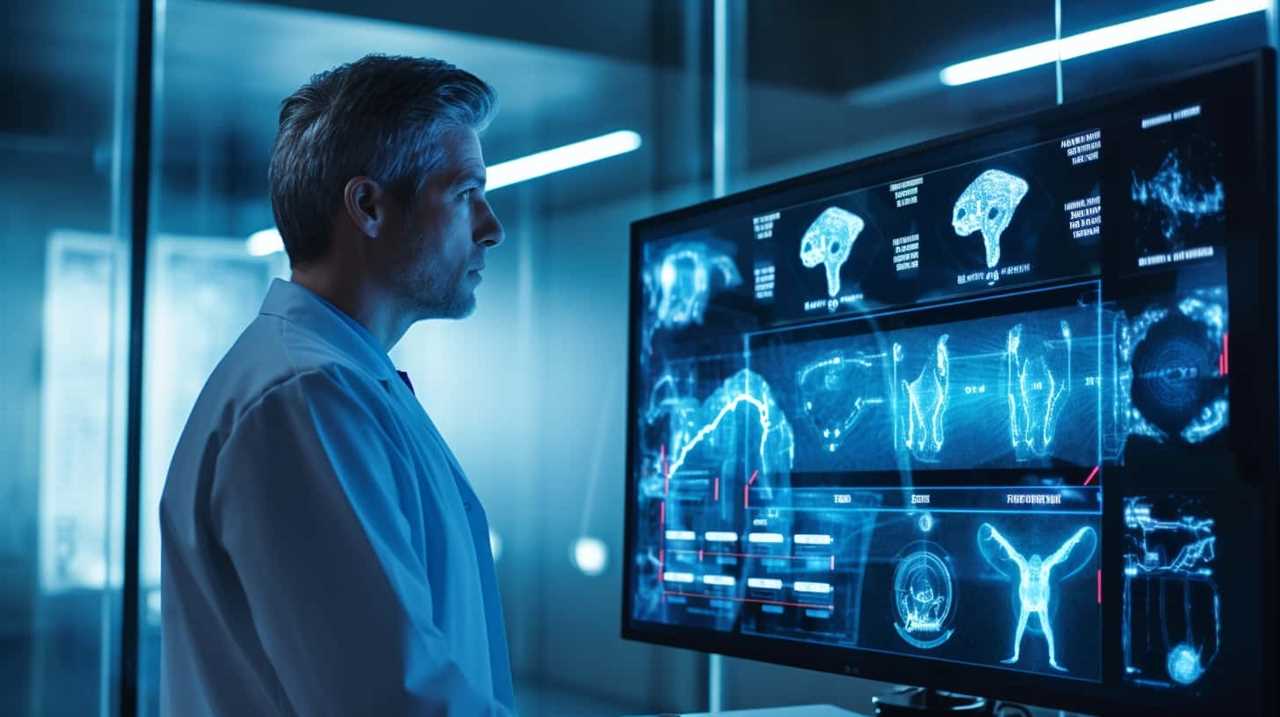We are transforming diagnosis and treatment with cutting-edge Medical AI technology. Our innovative approach improves diagnostic precision, tailors treatment strategies, and simplifies medical processes.
With improved patient outcomes at the forefront, we delve into the ethical considerations of this game-changing innovation. Brace yourselves for a paradigm shift in healthcare as we explore the untapped potential of Medical AI.
The future is here, and it starts with us.
Key Takeaways
- Augmented reality (AR) technology enhances diagnostic accuracy by providing real-time guidance during procedures and visualizing complex medical data.
- Predictive analytics and AI algorithms enable data-driven predictions about disease progression, treatment outcomes, and personalized medicine.
- AI technology streamlines medical workflow by automating routine tasks such as scheduling, record management, and billing.
- AI-powered remote monitoring systems and predictive analytics improve patient outcomes by enhancing engagement, enabling early detection, and assisting healthcare providers in making informed decisions.
Enhancing Diagnostic Accuracy
Enhancing diagnostic accuracy is crucial for improving patient outcomes and optimizing healthcare delivery. With the advent of augmented reality (AR) and predictive analytics, medical professionals now have powerful tools at their disposal to enhance the accuracy of their diagnoses.

AR technology allows doctors to overlay virtual information onto the real world, providing them with real-time guidance during diagnostic procedures. This immersive and interactive experience enables healthcare providers to visualize complex medical data in a more intuitive manner. By integrating AR into diagnostic processes, medical professionals can enhance their understanding of patient conditions, leading to more accurate and timely diagnoses.
Additionally, predictive analytics utilizes advanced algorithms to analyze large volumes of patient data and identify patterns and trends. By leveraging this technology, healthcare providers can make data-driven predictions about disease progression, treatment outcomes, and potential complications. This enables them to proactively intervene and make informed decisions, ultimately improving diagnostic accuracy and patient outcomes.
Personalized Treatment Plans
Continuing our exploration of the future of medical AI, we now turn our attention to the development of personalized treatment plans. With the advancement of artificial intelligence, healthcare providers are increasingly able to tailor interventions and provide individualized therapies to patients. This approach takes into account each patient’s unique medical history, genetic makeup, and lifestyle factors to create a treatment plan specifically suited to their needs.
Here are three key ways in which personalized treatment plans are revolutionizing healthcare:

- Precision Medicine: AI algorithms analyze vast amounts of data to identify patterns and make predictions about treatment outcomes. This enables physicians to prescribe medications and therapies that are most likely to be effective for each patient.
- Risk Assessment and Prevention: By analyzing a patient’s data, AI systems can identify individuals who are at a higher risk of developing certain conditions. This allows healthcare providers to implement preventive measures and interventions to reduce the risk of disease progression.
- Patient Empowerment: Personalized treatment plans empower patients by involving them in the decision-making process. AI systems provide patients with information about treatment options, potential side effects, and expected outcomes, allowing them to make informed choices about their own healthcare.
Streamlining Medical Workflow
To streamline medical workflow, we can leverage AI technology. Digital automation plays a crucial role in optimizing efficiency within healthcare settings. By automating routine and repetitive tasks, AI allows healthcare professionals to focus on more complex and critical aspects of patient care. Take a look at the table below to see how AI can streamline medical workflow:
| Task | Traditional Workflow | AI-Enabled Workflow |
|---|---|---|
| Appointment Scheduling | Manual entry and coordination | Automated scheduling and reminders |
| Medical Record Management | Paper-based system | Electronic health records (EHRs) |
| Prescription Ordering | Manual prescription writing | Digital prescription ordering and tracking |
| Billing and Coding | Manual documentation and coding | Automated billing and coding algorithms |
Improving Patient Outcomes
Our focus is on maximizing patient outcomes through the utilization of AI technology. By leveraging AI, we can enhance patient engagement and improve remote monitoring, leading to better overall outcomes.
Here are three ways AI is currently being used to achieve these goals:
- Personalized treatment plans: AI algorithms analyze vast amounts of patient data, including medical records, genetic information, and lifestyle data, to develop personalized treatment plans. This enables healthcare providers to tailor interventions to each patient’s specific needs, resulting in more effective and efficient care.
- Early detection and intervention: AI-powered remote monitoring systems can continuously collect and analyze patient data, such as vital signs and medication adherence. By flagging abnormal patterns or changes, AI can help identify potential health risks early on, allowing for timely interventions and prevention of complications.
- Predictive analytics: AI algorithms can analyze large datasets to identify patterns and predict outcomes, such as disease progression or treatment response. This information can assist healthcare providers in making more informed decisions and optimizing treatment strategies, ultimately leading to improved patient outcomes.
Ethical Considerations in Medical AI
Maximizing patient outcomes through AI technology requires careful consideration of ethical implications. Two critical ethical considerations in medical AI are bias detection and privacy concerns.

Bias detection is essential to ensure that AI algorithms don’t perpetuate existing biases or discriminate against certain patient populations. By analyzing vast amounts of patient data, AI can uncover hidden biases and help healthcare providers make more informed decisions. However, it’s crucial to address any biases detected and mitigate their impact on patient care.
Privacy concerns in medical AI arise from the collection and use of sensitive patient data. While AI algorithms rely on vast amounts of data to make accurate predictions and diagnoses, it’s vital to safeguard patient privacy and ensure that data is anonymized and securely stored. Striking the right balance between utilizing patient data for AI advancements and protecting patient privacy is paramount to maintaining trust in medical AI systems.
Frequently Asked Questions
How Does Medical AI Enhance Diagnostic Accuracy Compared to Traditional Methods?
Using medical AI enhances diagnostic accuracy by improving efficiency and accuracy compared to traditional methods. It streamlines data analysis, increases pattern recognition capabilities, and reduces human error, leading to more accurate and timely diagnoses.
What Are the Key Factors Considered in Creating Personalized Treatment Plans Using Medical Ai?
Key factors considered in creating personalized treatment plans using medical AI include patient data analysis, medical history, genetic information, and real-time monitoring. By combining these factors, AI can optimize treatment strategies for individual patients, enhancing their overall healthcare outcomes.

How Does Medical AI Streamline the Medical Workflow and What Benefits Does It Provide for Healthcare Professionals?
Medical AI streamlines the medical workflow, improving efficiency and increasing accuracy. It simplifies tasks like data analysis and documentation, allowing healthcare professionals to focus more on patient care. The benefits are immense.
Can Medical AI Improve Patient Outcomes in a Cost-Effective Manner?
Yes, medical AI has the potential to improve patient outcomes in a cost-effective manner. By analyzing large amounts of data, AI can identify patterns and provide personalized treatment plans. Additionally, AI can enhance patient engagement and ensure data privacy.
What Ethical Considerations Should Be Taken Into Account When Implementing Medical AI in Healthcare Settings?
When implementing medical AI in healthcare settings, ethical considerations such as data privacy and bias mitigation must be taken into account. These factors ensure that patient information is protected and that AI algorithms provide fair and accurate diagnoses and treatments.
Conclusion
In conclusion, the future of medical AI holds immense potential in revolutionizing diagnosis and treatment. With enhanced diagnostic accuracy, personalized treatment plans, streamlined medical workflow, and improved patient outcomes, AI technology is set to transform the healthcare industry.

However, it’s crucial to navigate ethical considerations surrounding the use of AI in healthcare. Like a guiding compass, medical AI has the power to steer us towards a future where precision and efficiency in healthcare become as seamless as a well-oiled machine.











